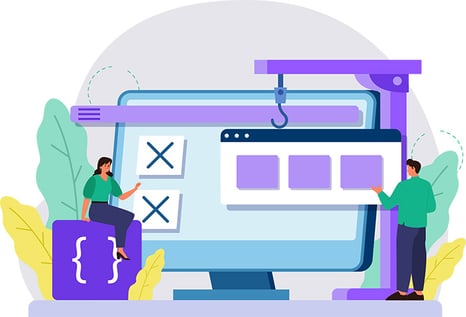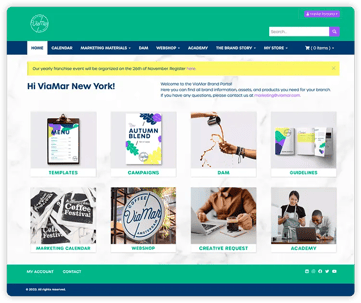
Choosing for success: building vs buying a distributed marketing platform
Last updated: October 3, 2025
In the ever-evolving world of marketing, deciding whether to build your own distributed marketing solution or buy an existing one is crucial. This choice isn't just about features or costs; it's about what is best for your business in the long run. Let's dive into some key factors of building vs. buying, helping you to make a smart, informed decision for your marketing and business goals.What is a distributed marketing solution?
A distributed marketing solution refers to the tactics, technology, and platforms used by marketers to scale marketing activities and enable associates, partners, and teams to customize and deploy marketing assets without diluting the brand. Distributed networks can be used to build a stronger local connection with customers, increase the volume of marketing content deployed, and improve sales.

How a distributed marketing platform works
Understanding Total Cost of Ownership (TCO)
.jpg?width=371&height=371&name=total%20cost%20of%20ownership(TCO).jpg) When it comes to choosing between building or buying a marketing platform, it is important to think about more than just the initial price tag. Total Cost of Ownership (TCO) is all about understanding the full cost over time. This includes not just what you pay for development at the start, but also the costs for things like updates, support, and making sure the solution can grow with your business. Whether you build or buy, knowing these costs helps you make a better choice for your budget and your business's future.
When it comes to choosing between building or buying a marketing platform, it is important to think about more than just the initial price tag. Total Cost of Ownership (TCO) is all about understanding the full cost over time. This includes not just what you pay for development at the start, but also the costs for things like updates, support, and making sure the solution can grow with your business. Whether you build or buy, knowing these costs helps you make a better choice for your budget and your business's future.
Building a distributed marketing solution
Considering the option of building a distributed marketing solution offers a unique opportunity to craft a solution that precisely fits your business’s needs and vision.
Total Cost of Ownership for building
- Upfront development costs: High, due to the need for custom development.
- Ongoing maintenance: Requires continuous investment in technical staff and resources. The ongoing maintenance cost for custom-built platforms can be up to 30% higher than for purchased solutions.
- Scalability costs: Potentially high if the platform needs significant upgrades to handle growth and new feature development.
 Pros
Pros
- Customization and flexibility: Tailored to your specific business needs.
- Control over features and functionality: Total autonomy in adding or removing features.
- Integration with existing systems: Can be designed to work with your current workflows and align with broader business goals.
Cons
- High upfront costs: Significant expense for the initial development phase.
- Time-consuming development process: Can take months or years to fully develop.
- Need for technical expertise: Requires hiring or outsourcing skilled professionals, adding to the cost.
Buying a distributed marketing platform
Choosing to purchase a distributed marketing platform can be more convenient and offer more functionality than an internally built solution
Total Cost of Ownership for building
- Upfront costs: Lower, typically involving a subscription fee.
- Ongoing maintenance: Handled by the vendor, often included in the subscription.
- Scalability costs: Usually more predictable and managed through tiered pricing models.
Pros
- Lower upfront costs: Costs are known and budget creep risks are mitigated.
- Faster implementation time: Quick deployment (saving up to 50% compared to building) as the solution is already developed.
- Benefits of experience: Proven, robust product improved by user feedback and continual product development.
Cons
- Limited customization options: May need to adapt your internal processes to the platform.
- Dependence on developer: Reliant on the vendor for updates and maintenance.
- Potential for vendor lock-in: Challenges in changing platforms or vendors.
Conclusion: a strategic decision
Ultimately, the decision to build or buy a distributed marketing solution hinges on a range of factors including TCO, time, resources, and specific business needs. Building offers greater customization and control but comes with significant cost and time investment. Buying offers cost efficiency and speed but may limit customization and control.
In the end, the best platforms are flexible enough to meet the specific needs of individual businesses. By carefully considering all factors, businesses can make an informed decision about the best approach for their organization.
Facing the 'build vs. buy' decision for a distributed marketing platform? Schedule a demo with Marvia and get tailored advice to make the best choice for your organization.

